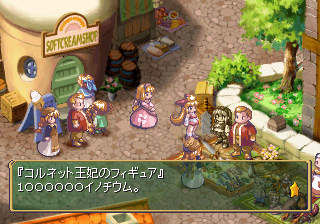
After waiting around for several minutes in real time outside someone’s house or trailing them around all day, you might stumble into their questline and be rewarded with a measly one Love. Without a guide, you’re left to figure out arcane sequencing and puzzles solved only by vague moon logic (quite literally). The game’s as laugh-out-loud funny as it is deeply disturbing, and, each night, the king assures you that each interaction you had that day was an act of love. The next, you’re being lectured by a secret society of superhero eco-feminists. One minute, you’re tripping on mushrooms you harvested in a forest and revive a dead god killed by the wayward hero. Moon is one of the most impactful experiences I’ve had in gaming. At every juncture, the focus is on Love and the tireless reaping of it.

The only real benefit of leveling up is an increase in your amount of time each day, which allows you to seek Love longer. Once you reach a certain amount, you level up. Each night, when you sleep, the king visits you and tallies up your Love. You can increase your maximum energy through interacting with other characters and earning Love, which might manifest as a minigame or just be matter of being in the right place at the right time. You start each day with a limited amount of energy that decays over time, and if you don't rest before it depletes, you die. In Moon, you have to learn to let people go, to appreciate the short relationships you have.

She just reassures you she loves you and gives you a cookie. Gramby, being a video game character within a video game, runs out of unique dialogue. Lively areas in the game quiet down and corpses are revived and collected. You’re visited in the night by a king who tells you to find Love, which he describes as “The power to see the unseeable.”Īs you gain Love, you clear out landscapes. After some wandering, you find yourself at an old woman’s house she mistakes you for her grandson, who coincidentally has the same name as you, the same name you typed into the game. Monsters you killed reveal themselves to be harmless dogs and docile slimes, not grotesque and violent enemies. In the game, the hero you played as is wreaking havoc on the world’s monsters, rapidly leveling, and ignoring the intricate lives of the denizens of Love-de-Gard. Right as he heads to his bedroom, the television sucks him in, landing him inside the game’s world. Just before he finishes, his mom beckons him to bed. The boy skips through lines of dialogue and quickly makes it to the end, challenging an evil dragon who threatens the realm of Love-de-Gard.
-4-thumb.jpg)
The game is as cliche as they come-it starts with a lengthy exposition which comically grows larger and larger until the words are illegible. Despite the obvious reference, the game looks closer to something from the SNES era battles look quite similar to Dragon Quest. You play as a young boy, named by you, who starts an RPG on his Gamestation. The game’s premise is simple enough: It’s something of a game within a game.


 0 kommentar(er)
0 kommentar(er)
